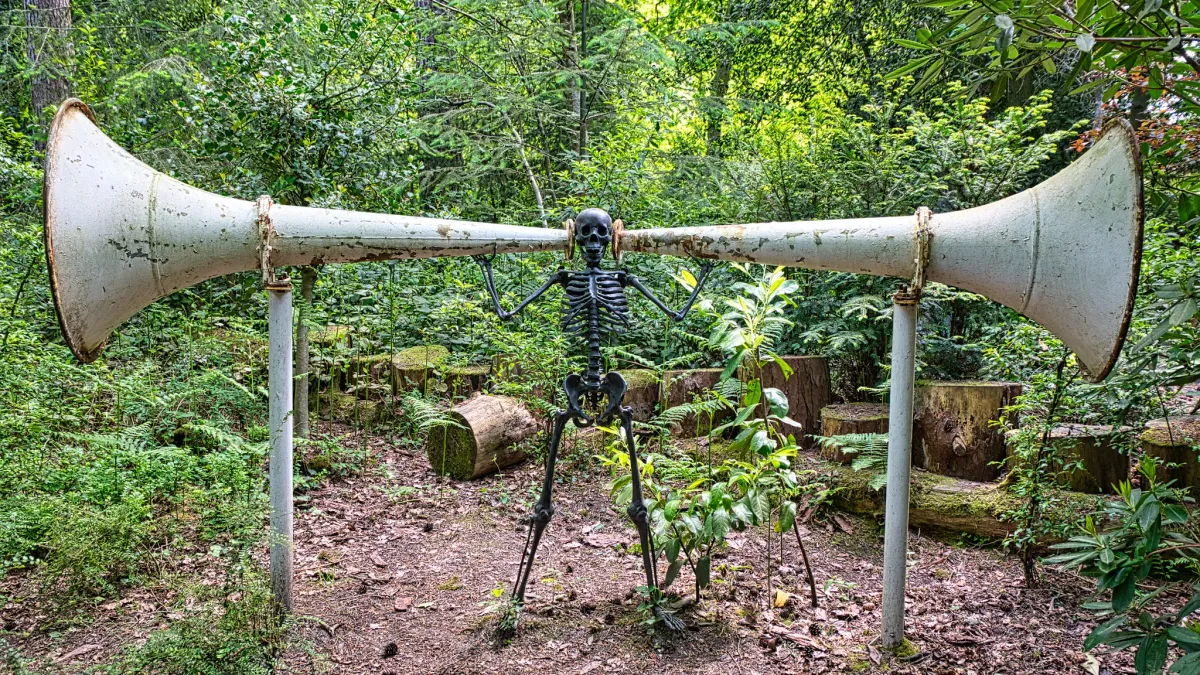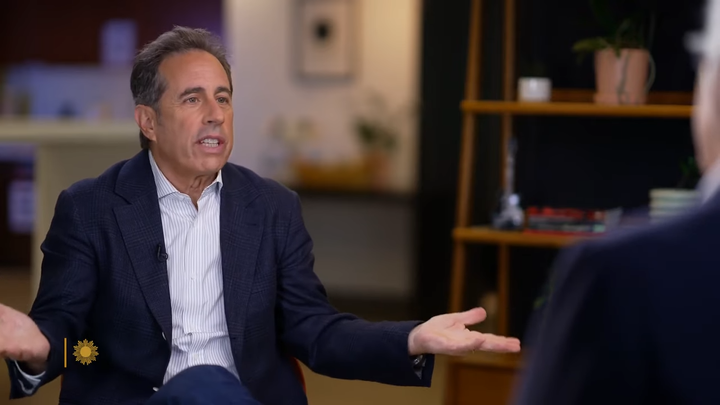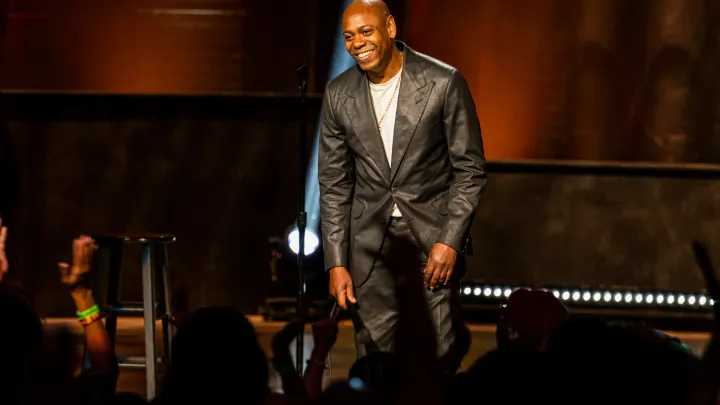Uncancellable Culture
Read to the end for some hot recs.

In 2007 George Saunders published The Braindead Megaphone, a parable about the distorting effects of mass media. The essay's central metaphor goes something like this: a bunch of people from all walks of life are at a party when a guy walks in with a megaphone. He's not a smart or articulate guy, in fact he's quite stupid, but he has a megaphone, so everyone hears what says. Try as the other partygoers might to keep up their own conversations, the guy is so loud and so dense that he come to dominate everyone else's conversations. They agree with him, they disagree with him, they unconsciously adopt his peculiar phrasings and mannerisms, his ideas seep into their heads and take root. Such is the function of mass media, specifically right-wing mass media, specifically profit-driven right-wing mass media propping up entertainment as news, whose corrupting influence Saunders blames for the Iraq War and the general degradation of public discourse.
Unfortunately the fix Saunders proposes is not to turn the megaphone off but to combat braindead ideas with better ideas. "Every well-thought-out rebuttal to dogma, every scrap of intelligent logic, every absurdist reduction of some bullying stance is the antidote," he writes. "Every request for the clarification of the vague, every poke at smug banality, every pen stroke in a document under revision is the antidote." You might call it The Daily Show Solution. I think it's safe to say it didn't pan out.
Saunders wrote before the advent of social media and cannot be blamed for what his metaphor failed to foresee. What ended up happening is more like this: megaphone guy becomes very popular. He gathers a crowd of onlookers thirstily lapping up everything he says. Many of them have their own megaphone and their own equally thirsty crowds. Occasionally someone across the room will pipe up to disagree with megaphone guy, perhaps combating the braindead ideas with better ones. In response, megaphone guy's acolytes rush over and beat that person up. There are others at the party who agree with the unlucky fool, but upon witnessing this display they decide to keep it to themselves. They're here for the rum punch, after all, not to talk politics. Others watch the mob enact mob justice and think to themselves, "Huh, I didn't realize it was okay to do that." They sidle over to megaphone guy's side of the room.
It's a big house. On the other side is a room of nice, intelligent people chatting quietly. They know megaphone guy is somewhere out there with all his little megaphone men, but they've removed themselves from the equation. When the sound of his ramblings wafts down the hall, they shut the door and turn up the victrola. When they hear the mob unleash its wrath on someone else, they chuckle at the irony: how deliciously rich to exhibit such fragility in the face of dissent! Why can't the dominant faction simply be content with its dominance? The subject quickly exhausts them, however, and they return to their own interests. When someone rushes in to announce megaphone guy's latest deranged proclamations, they respond with boredom. "I'm sick of hearing about megaphone guy," they say. "Why can't we talk about interesting people saying interesting things?" As megaphone guy and his disciples spread from room to room—as their roar grows louder, as anyone who might become their target flees the house entirely—the nice, intelligent people lock their door and keep on chatting.
For now.
I recommend checking out Kliph Nesteroff's timeline anytime a comedian complains about cancel culture:
April 1903.
A newspaper editorial warned that if racial and ethnic stereotypes were no longer acceptable on the stage - you could say "good-bye to comedy." pic.twitter.com/EmnPdPyNZ1October 24, 2021
January 5, 1972.
Variety published some You Can't Joke About Anything Anymore Fan Fiction. pic.twitter.com/WSsHFHpPc9October 28, 2021
April 1969 pic.twitter.com/ejFg0e7g6eOctober 28, 2021
1931. pic.twitter.com/O2fRBjuBFqOctober 28, 2021
An editorial that ran in Variety in July 1945. pic.twitter.com/zA66lRhElOOctober 18, 2021
1962.
The broadcaster Arthur Godfrey complained, “Now you can’t kid anyone anymore. Negro and Italian jokes are out. It’s sad.” pic.twitter.com/MBWvUbYA2gOctober 22, 2021
December 1958.
Comedian Danny Thomas defied critics who suggested he eliminate stereotypes from his act. pic.twitter.com/PwbTbSQzePOctober 25, 2021
December 1957. pic.twitter.com/rGohqxJVwwOctober 25, 2021
1971 pic.twitter.com/lRsqYSH5DIOctober 25, 2021
I see a few intersecting readings of these posts. One is that (some) comedians have always framed audience backlash as a culture-wide censoriousness threatening to destroy their art form. A second (offered by Nesteroff in the LA Times) is that comedians, who used to face arrest and prosecution for disagreeable jokes, truly do have more freedom of speech than ever before. A third is that the comedy industry has made surprisingly little progress toward expunging reactionary thought from its spaces over the last 100 years.
Those who fail to learn from history are doomed to repeat it, the axiom goes. I'd like to propose another clause: while we're at it, we should probably try to learn from the present too.
Below is a post by the leftist writer and editor Joe Macaré.
Transphobia in the UK is now constant, aggressive, and coming from all sides of established media, from right to "center" (the BBC) to "left" (the Guardian). Both major political parties are now involved.
It barely bothers to conceal the homophobia anymore -- the reaction to the John Lewis ad, the Stonewall "investigation" smear campaign and the imagery used to accompany it... it's all very familiar, very bog standard school playground bullying and attacked-outside-the-pub stuff.
If you're in the UK... you have my sympathy and my support in fighting this. If you're not already fighting this, please resist the propaganda and be aware how urgent this is.
For those of us outside the UK, it's really important to note that this was a process. It didn't happen overnight. Important because every time the "don't be divisive or censorious!" stuff comes up in the US, it has to be recognized as part of that process. I am talking to other cis people when I say we have a responsibility to be uncompromising and adamant on this. Transphobia needs to be socially and professionally unacceptable in every area. And especially on the left and in the media, I mean Jesus. Your magazine still gives a TERF a column? One of your editors spends a good chunk of his time defending transphobia? You never hire or publish trans people? Fuck you.
The idea seems to be that if we stop talking about people who use comedy for cruelty, if we simply focus on our attention on good comedy, the bad guys will stop being a problem. I'm sorry but that's how we got here in the first place. When we fail to make bigotry unacceptable in our own spaces, those spaces grow more and more reactionary, and so does the society they constitute. You can see this happening in real time with each new public figure emboldened to post transphobia on main. There's nothing complicated about it. Once a guy with a megaphone says something, other people start saying it. If that guy is a famous comedian saying out-there shit you're not supposed to say, guess what: the Overton window shifts. To revisit a paper I discussed behind the paywall last month:
In the case of far-right extremism, humour helps to reframe hate-based ideologies, thereby reducing objections towards positions that would otherwise be condemned by the wider public. At the same time, it helps to cover up one’s own barbarity and to ignore the consequences of one’s own rhetoric and actions.
One popular argument holds that loudly condemning the Dave Chappelles of the world actually serves the Dave Chappelles of the world, because what the Dave Chappelles of the world really want is attention and relevance. This argument is wrong and stupid. It's wrong because the Dave Chappelles of the world are not fringe figures using provocation to attain mainstream recognition; they're mainstream figures saying what they genuinely believe to large, ideologically malleable audiences. It's stupid because it ignores the political function served by the Dave Chappelles of the world. To understand this function, let us turn to the great David Graeber:
The ideal victim is not absolutely passive. No, the ideal victim is one who fights back in some way but does so ineffectively, by flailing about, say, or screaming or crying, threatening to tell their mother, pretending they’re going to fight and then trying to run away. Doing so is precisely what makes it possible to create a moral drama in which the audience can tell itself the bully must be, in some sense, in the right.
This triangular dynamic among bully, victim, and audience is what I mean by the deep structure of bullying. It deserves to be analyzed in the textbooks. Actually, it deserves to be set in giant neon letters everywhere: Bullying creates a moral drama in which the manner of the victim’s reaction to an act of aggression can be used as retrospective justification for the original act of aggression itself.
It goes like this. Dave Chappelle or Joe Rogan or whoever walks onstage and spouts harmful transphobic bullshit. Trans people respond by telling him he's just spouted harmful transphobic bullshit. Dave Chappelle or Joe Rogan or whoever then says hey, look at these trans people trying to cancel reasonable old me. He teaches his audience to view trans people as powerful antagonists, not only to himself but also to them—contemporary audiences identify very strongly with their favorite comics—and to the liberal values he represents. Again, you can see this happening in real time. When The Hollywood Reporter told SNL alum Garrett Morris it was uncomfortable with the way Chappelle targeted trans people in The Closer, Morris responded: "They were going after him. That was a response to something." Seconds later he implied the unwillingness of Chappelle's critics to submit to transphobic jokes is a sign of their illiberalism:
Relax, everybody, this is comedy. Everybody can be the butt of a joke. And why should it be that if we joke about you, it’s sacrilege? You sit in the audience and laugh at jokes about everybody else. If we make a joke about trans [people] or gays, suddenly it’s sacrilege. And that’s what I got from that. I don’t see what’s wrong with that, with all due respect. I see it as nothing but a man saying publicly, “This is what I do.” And if you can’t understand that this is comedy coming at you, then don’t live in a society that’s multicultural.
To the comic and his audience, the drama is between him and a niche interest group. Chappelle doesn't acknowledge or even seem to notice that wide swaths of the public, trans and cis, are invested in trans liberation. Instead he is the victim of a small faction with undeserved influence. (An under-appreciated aspect of The Closer is Chappelle's assertion that all the accusations of transphobia he receives are just "repeating talking points" from a review in "the gay papers" of a show he did in Oakland 16 years ago, when he was a "nobody" who had just quit Chappelle's Show and didn't yet know not to say "tr––y," a word he used in one of his 2017 specials. Consider the depth of obsession and contortion these thoughts reflect.) Intentional or not, this is the effect of Chappelle's increasingly desperate complaints about "alphabet people": to put the LGBTQ community in the very reasonable position of responding to what he says, empowering him to go right back up and frame the LGBTQ community as a hostile (and monolithic) actor.
Only a fool or a liar would argue that this dynamic does not benefit the broader movement against LGBTQ liberation. More importantly, the dynamic does not go away if you ignore it. To the contrary, ignoring it strengthens the comic's position by giving him ever more ground to pretend his only opponents are his targets (and that his targets are actually hysterical aggressors). If those truly were the only parties involved, sure, maybe ignoring him would sap his power. In reality the comic is speaking to millions of people. His actions matter whether we like to think about them or not.
No, the real solution is the hard one: for the disproportionately cis, male comedy industry's good people—they do exist—to put themselves on the line by naming, shaming, and refusing to work with transphobes and their enablers. If that sounds like a radical solution, I submit that it's much less radical than letting transphobia continue its slow march toward the mainstream. Which, when the discourse over this Netflix special or that viral video settles down, is exactly what's still happening.
What Else?
-Last week paying subscribers received an essay about Seeso. Upgrade your subscription to check it out:
-I hereby recommend the following newsletters by Adam Johnson (on media), Max Read (on tech and culture), and Jewel Galbraith (miscellaneous).
-If you're in LA, you still have time to get over to Dynasty Typewriter tonight for Everything's Great! If you're for some crazy reason occupied on a Friday night and not checking your email, stop by the new Elysian Theater next week. If you're in New York, allow me to recommend Animal Show at the Brooklyn Comedy Collective on Sunday or Standup with Nat Towsen on Thursday.
-I laughed at this video by Riley Taggart.
-I am very eager to read Melissa Lozada-Oliva's debut novel (in VERSE of all things), Dreaming of You.
-Thank you for reading and have a very spooky Halloween.
Header image via Geoff Henson/Flickr.


